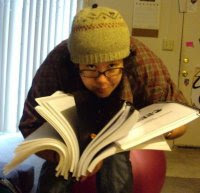Chickadees and Nuthatches have returned to our feeders. The squirrels, who ravaged and destroyed several feeders in spring, have pleasingly gone elsewhere. I find myself excited for autumn although the season here is not much like autumn back home.
The tomatoes have many many little green tomats and I've had to be dilligent about pruning and re-tying the one we've staked. Lesson learned: although stakes cost 50 cents and cages cost 2.50 the cage is much less time intensive, possibly worth it. The baby bean and cuke plants are getting bigger, and the peas that I planted in April are still occassionally issuing a pea or two. The carrots don't seem to be maturing, so perhaps the lesson here is that unlike radishes, carrots don't do that well in a container. Mini-gladiolus have yet to flower, the fuscias are pretty much done flowering, and the herbs are doing well, though they certainly would benefit from being placed in larger pots.
House: Since we aren't homeowners we had alot of room to choose with regard to our dwelling. Originally we moved into a large freestanding house >1500 sq feet. In Albany, about 10 miles from Corvallis. After testing out our ecofoot print one day (lots of online quizes to do this) we realized how wretched this choice was for our sustainability goals. We quickly decided to move to a much smaller apx. 500 sq. feet rowhouse just >2 miles from campus.
Electricity: Aside from the obvious (turning off lights/appliances, unplugging things not in use, using compact fluorescent light bulbs) we also purchased our power through Blue Sky which is all alternative source energy (mostly wind). It is slightly more expensive, but not much (for us an extra 2.00 or so). Options like this are avalable in many places ( in New England, in Midwest, and South).
Recycling and Composting: We have worked hard to reduce the amount of trash we make. On average the house of three adults and two dogs produces an average of 2.5 gallons of trash per week. While we think we can do better and are working to improve we do dispose of our trash in Bio-Bags, so at the very least this will help to promote the faster breakdown of our garbage. The rest of our stuff we either compost or recycle. The big thing about recycling that we're trying to promote (especially Bird because she worked for a recycling place) is that you must, must, must Only Recycle Things That Are Actually Recyclable. Putting non recyclable stuff in the recycling contaminates the bins and can cause recyclable materials to be turned to waste.
Food: Here's another area where the choices for reducing impact are many. Here in Casa Colibri we are nearly vegan, a food choice that substantially reduces eco-impact. I say nearly vegan because we have recently become much more concerned with local food as a sustainability practice. When it comes to local food we're so lucky because we live in the fertile and hippy filled Willamette Valley. Here there are tons of organic growers nearby. We buy organic whenever possible. There are certainly some foods that we will only eat organic. Organic is sometimes expensive, but buying locally and in season helps us to remediate these costs. We also dry and freeze items we buy in bulk while they are cheap. Hoping to learn how to can soon for more preservation options. Another helpful thing involving food is the abundance of bulk suppliers we have down here in Oregon. We buy everything from sugar and maple syrup to canola oil and soap in bulk. We use and reuse our own containers cutting down on waste and saving money.
Our Current Sustainability Goals: Stopping our junk mail (we get so much and it is lame!), increasing our gardening capacity, stopping all plastic use and purchase, no new shopping bags, increasing local food purchase, reducing waste to 3 gallons every 2-3 weeks, stopping cellphone use.
Long Term Goals: an extremely fuel efficient vehicle, a green building as our dwelling, all organic, 0 waste, off grid technology (solar, greywater)


2 comments:
Carrots seem to like a sandy soil more than regular poting or garden soil! My tomates are not that great this year. Tooooo much rain!
the flowers like it though!
LUV ya AAA!
Yay sustainability! I'm glad you two don't actually kill me for always freaking out about sustainability and whatnot.
Post a Comment